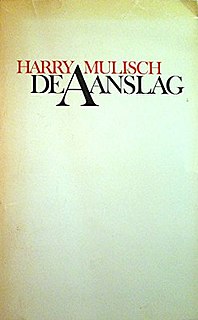 W
WThe Assault is a 1982 novel by Dutch author Harry Mulisch. Random House published an English translation by Claire Nicolas White in 1985. It covers 35 years in the life of the lone survivor of a night in Haarlem during World War II when the Nazi occupation forces, finding a Dutch collaborator murdered, retaliate by killing the family in front of whose home the body was found. According to the New York Times, this novel "made his reputation at home and abroad". It was translated into dozens of languages and immediately adapted into a film of the same name that won the 1986 Academy Award for Best Foreign Language Film.
 W
WBartje Bartels is the main character in a series of Dutch books written by Anne de Vries from 1935 on. Bartje is boy who lives with his poor family in the countryside of Drenthe. His parents want him to become a farmer like his father, but Bartje has other ideas. He initially works as an apprentice, but when his mother dies, he has to look after his younger brothers and sisters.
 W
WBlack Book is a Dutch-language 2006 thriller novel by Laurens Abbink Spaink. It is the novelization of the Dutch film Black Book (2006). It tells the story of a young Jewish woman, Rachel Stein, and her struggle for survival during and after the Second World War. The book has a photo section, and an afterword by Paul Verhoeven and Gerard Soeteman.
 W
WBlack Chamber by S. M. Stirling begins a new series in which Theodore Roosevelt's bid for the U.S. Presidency in 1912 was successful. The story begins on September 1, 1916 and features a "Black Chamber" that is much more than the historical U.S. Government agency.
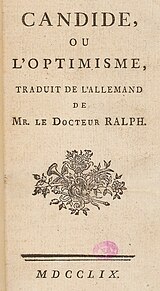 W
WCandide, ou l'Optimisme is a French satire first published in 1759 by Voltaire, a philosopher of the Age of Enlightenment. The novella has been widely translated, with English versions titled Candide: or, All for the Best (1759); Candide: or, The Optimist (1762); and Candide: Optimism (1947). It begins with a young man, Candide, who is living a sheltered life in an Edenic paradise and being indoctrinated with Leibnizian optimism by his mentor, Professor Pangloss. The work describes the abrupt cessation of this lifestyle, followed by Candide's slow and painful disillusionment as he witnesses and experiences great hardships in the world. Voltaire concludes Candide with, if not rejecting Leibnizian optimism outright, advocating a deeply practical precept, "we must cultivate our garden", in lieu of the Leibnizian mantra of Pangloss, "all is for the best" in the "best of all possible worlds".
 W
WCaptain Jan is a 1940 novel by Dutch writer Jan de Hartog. The book depicts highly skilled tugboat sailors as modern successors to the bold navigators of the Dutch Golden Age. It was made into a Dutch TV series in 1976.
 W
WCatriona is an 1893 novel written by Robert Louis Stevenson as a sequel to his earlier novel Kidnapped (1886). It was first published in the magazine Atalanta from December 1892 to September 1893. The novel continues the story of the central character in Kidnapped, David Balfour.
 W
WCharacter is a novel by Dutch author Ferdinand Bordewijk published in 1936. Subtitled "Een roman van zoon en vader", "a novel of son and father", it is a Bildungsroman that traces the relationship between a stern father and his son. Character is Bordewijk's best-known novel, and the basis for a 1997 film of the same name.
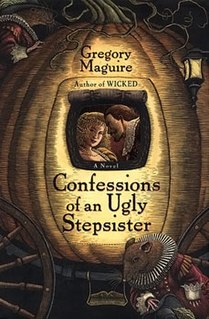 W
WConfessions of an Ugly Stepsister is a novel by Gregory Maguire, retelling the tale of Cinderella through the eyes of one of her "ugly stepsisters." In 2002, the book was adapted into a TV movie of the same name directed by Gavin Millar.
 W
WDik Trom is a series of Dutch children's books by Cornelis Johannes Kieviet, centered on the character Dik Trom. The series is well regarded as a classic in its home country.
 W
WThe Discovery of Heaven is a 1992 novel by Dutch writer Harry Mulisch. It is considered Mulisch's masterpiece and was voted best book in the Dutch language in a 2007 poll among the readers of NRC Handelsblad.
 W
WDown Ryton Water is a children's historical novel by Eva Roe Gaggin. It tells the story of the Separatists of Scrooby and the Pilgrim Fathers through the first-person narrative of young Matt Over. The novel, illustrated by Elmer Hader, was first published in 1941 and was a Newbery Honor recipient in 1942.
 W
WEline Vere is an 1889 novel by the Dutch writer Louis Couperus. It was adapted into the 1991 film Eline Vere, directed by Harry Kümel. Couperus wrote Eline Vere in the house at Surinamestraat 20, The Hague.
 W
WFloodgate is a novel by Scottish author Alistair MacLean, first published in 1983.
 W
WGirl with a Pearl Earring is a 1999 historical novel written by Tracy Chevalier. Set in 17th-century Delft, Holland, the novel was inspired by local painter Johannes Vermeer's Girl with a Pearl Earring. Chevalier presents a fictional account of Vermeer, the model and the painting. The novel was adapted into a 2003 film of the same name and a 2008 play.
 W
WGod's Fool: A Koopstad Story is an English-language novel by the Dutch writer Maarten Maartens, first published in 1892. The title is based on 1 Corinthians 3:19: "For the wisdom of this world is foolishness with God." Elias Lossell, the principal character, may be a fool, but he has God's wisdom.
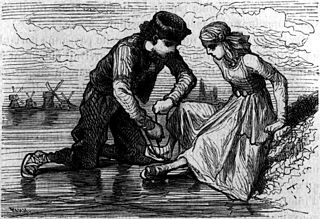 W
WHans Brinker, or The Silver Skates is a novel by American author Mary Mapes Dodge, first published in 1865. The novel takes place in the Netherlands and is a colorful fictional portrait of early 19th-century Dutch life, as well as a tale of youthful honor.
 W
WHasko is the title of the most successful novel of German pedagogue, bard, theatre maker and writer Martin Luserke. It is published in German, Dutch and French language.
 W
WHEX is a horror novel by Dutch author Thomas Olde Heuvelt. It was first published in Dutch in 2013 through Luitingh-Sijthoff and was published in English in 2016 through Tor Books, marking the first time one of Olde Heuvelt's novels have been published in English. The English version was translated by Nancy Forest-Flier and the decision was made to localize the work by shifting the story's setting from the Netherlands to New York.
 W
WThe Kaiser's Last Kiss is a 2003 novel written by Alan Judd. The story gives a fictional account of the last few days in the life of exiled Kaiser Wilhelm II after his home at Doorn, Netherlands is taken over by the invading Germans during the opening months of the Second World War. The book was published by Harper Perennial. In October 2015, filming started for the adaptation of the book starring Lily James and Jai Courtney.
 W
WVan de koele meren des doods is a Dutch novel by Frederik van Eeden, first published in 1900. It is one of the canonical Dutch novels, and is praised for its representation of the female protagonist; the novel established van Eeden as a "master of the psychological novel." A 1982 movie was based on the novel.
 W
WThe Laughing Cavalier is a 1913 adventure novel by Baroness Orczy, which revolves around Percy Blakeney, a foreign adventurer and ancestor of Orczy's famous character, the Scarlet Pimpernel. The story takes place in Holland in 1623/1624 and is partly inspired by Frans Hals' painting The Laughing Cavalier: in the novel, Blakeney is Frans Hals' adopted son and the man who poses for the painting of the Laughing Cavalier.
 W
WThe Legend of Thyl Ulenspiegel and Lamme Goedzak is an 1867 novel by Belgian author Charles De Coster. Based on the 14th-century Low German figure Till Eulenspiegel, Coster's novel recounts the allegorical adventures as those of a Flemish prankster, Thyl Ulenspiegel, directly before and during the Dutch Revolt against Spanish rule in the Netherlands.
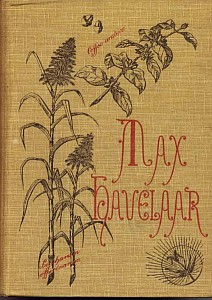 W
WMax Havelaar; or, The Coffee Auctions of the Dutch Trading Company is an 1860 novel by Multatuli, which played a key role in shaping and modifying Dutch colonial policy in the Dutch East Indies in the nineteenth and early twentieth century. In the novel, the protagonist, Max Havelaar, tries to battle against a corrupt government system in Java, which was then a Dutch colony. The novel is also famous for its opening line: "Ik ben makelaar in koffie".
 W
WThe Negotiator is a crime novel by Frederick Forsyth first published in 1989. The story includes a number of threads that are slowly woven together. The central thread concerns a kidnapping that turns into a murder and the negotiator's attempts to solve the crime.
 W
WThe Pietje Bell series of novels is a series of children's books written by the Dutch writer Chris van Abkoude. It's about a little boy who gets himself into trouble.
 W
WTow-Truck Pluck is a children's book by Dutch writer Annie M.G. Schmidt. First published in 1971, it remains in print and is one of the most popular Dutch books for children, and the second most popular book by Schmidt. A radio drama based on the book was produced in 2002, and a movie in 2004; Tow Truck Pluck ranked No. 10 on the list of most popular Dutch movies between 1996 and 2005 and was awarded platinum status early in January 2005. The cover of Pluk is used to illustrate the article about Schmidt on the website of the "Canon of the Netherlands," and Pluk got his own stamp in 1999.
 W
WPuppet on a Chain is a novel by Scottish author Alistair MacLean. Originally published in 1969 with a cover by Norman Weaver, it is set in the late 1960s narcotics underworld of Amsterdam and other locations in the Netherlands.
 W
WQuicksilver is a historical novel by Neal Stephenson, published in 2003. It is the first volume of The Baroque Cycle, his late Baroque historical fiction series, succeeded by The Confusion and The System of the World. Quicksilver won the Arthur C. Clarke Award and was nominated for the Locus Award in 2004. Stephenson organized the structure of Quicksilver such that chapters have been incorporated into three internal books titled "Quicksilver", "The King of the Vagabonds", and "Odalisque". In 2006, each internal book was released in separate paperback editions, to make the 900 pages more approachable for readers. These internal books were originally independent novels within the greater cycle during composition.
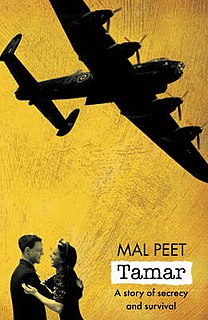 W
WTamar is a young-adult novel by Mal Peet, published by Walker Books in 2005. Within a 1995 frame story, where a 15-year-old girl inherits papers and other mementos from her deceased grandfather, it is set in the occupied Netherlands near the end of the Second World War; there it features two British-trained Dutch agents and the resistance to German occupation of the Netherlands. The novel interweaves past and present to show the lasting effects of war and the passions it arouses.
 W
WThe Twin is a novel by Dutch writer Gerbrand Bakker. It won the International Dublin Literary Award in 2010, making Bakker the first Dutch writer to win the award, one of the world's richest literary awards, with a €100,000 prize. Boven is het stil was published in 2006 and its English translation, titled The Twin, followed in 2008. The novel was translated from Dutch by David Colmer. The novel's original Dutch title could be translated as "Upstairs, everything is quiet".
 W
WVan Loon's Lives is a book by the Dutch-American writer Hendrik Willem van Loon published in 1942. Its full title, deliberately written in a manner already archaic at the time of writing, is Van Loon's Lives: Being a true and faithful account of a number of highly interesting meetings with certain historical personages, from Confucius and Plato to Voltaire and Thomas Jefferson, about whom we had always felt a great deal of curiosity and who came to us as dinner guests in a bygone year.
 W
WWe Didn't Mean to Go to Sea is the seventh book in Arthur Ransome's Swallows and Amazons series of children's books. It was published in 1937. In this book, the Swallows are the only recurring characters. They are staying with their Mother and baby sister Bridget in a new location, Pin Mill on the River Orwell upstream from the ports of Felixstowe and Harwich and are in Suffolk to meet their Father, Navy Commander Ted Walker who is returning overland from a posting in Hong Kong to take up a new posting at Shotley. (In Swallows and Amazons his ship was at Malta but under orders for Hong Kong.
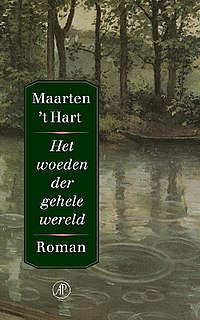 W
WHet Woeden der Gehele Wereld is a 1993 Dutch novel by Maarten 't Hart. The title translates as "The fury/rage/raging of the whole world" and is derived from the text of the poem Au bord de l'eau by Sully Prudhomme, set to music by Gabriel Fauré. It is about the coming of age of Alex Goudveyl, who is bullied by other children and protected by Vroombout, and about a murder that took place some ten years after the time of the German occupation of The Netherlands in World War II.